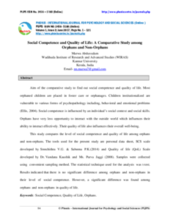Abstract
Aim of the comparative study to find out social competence and quality of life. Most orphaned children are placed in foster care or orphanages. Children institutionalized are vulnerable to various forms of psychopathology including, behavioral and emotional problems (Ellis, 2004). Social competence is influenced by an individual’s social context and social skills. Orphans have very less opportunity to interact with the outside world which influences their ability to interact effectively .Their quality of life also influences their overall well-being.
This study compares the level of social competence and quality of life among orphans and non-orphans. The tools used for the present study are personal data sheet, SCS scale developed by Sreechithra V.G. & Sabeena P.K.(2014) and Quality of life (QoL) Scale developed by Dr. Vandana Kaushik and Ms. Purva Jaggi (2008). Samples were collected using convenient sampling method. The statistical technique used for the analysis was t-test. Results indicated that there is no significant difference among orphans and non-orphans in their level of social competence. However, a significant difference was found among orphans and non-orphans in quality of life.

